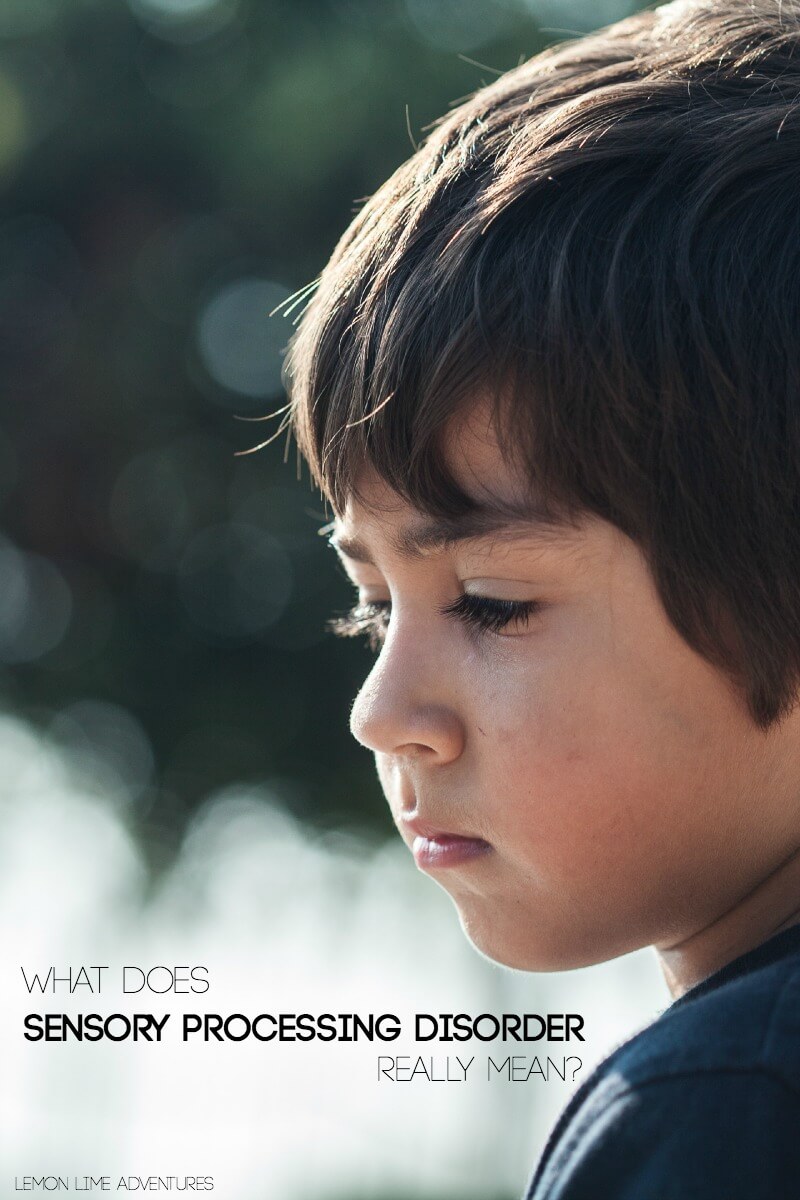There seems to be a lot of talk about sensory processing disorder lately. That’s a good thing, right? It means people are starting to become more aware and understand more. There’s just one problem with that statement… those of us living it every day don’t even understand it fully. Some days are a complete struggle while others are completely rewarding.

Many might ask what is sensory processing disorder…
I’ll tell you. ..
What Does Sensory Processing Disorder REALLY Mean?
Sensory processing disorder means never knowing how your child is going to feel from day to day.
Sensory processing disorder means others will look at you like a bad parent, like “why can’t you just control your child”.
Sensory processing disorder means your child may never look you in the eye or learn to hug you.
Sensory processing disorder means feeling lost as a parent one moment and feeling relief the next.
Sensory processing disorder means you never know if today is the day others will see the child you know your child can be.
Sensory processing disorder means fighting and struggling with love ones to find answers and agree on solutions.
Sensory processing disorder means becoming a helicopter parent even though you wish you weren’t.
Sensory processing disorder means never knowing if you will have to cancel on your loved ones plans at the last minute.
Sensory processing disorder means feeling guilty as a mom because you just can’t take the noises, the touches, and the meltdowns one more day.
Sensory processing disorder means unconditional love.
Sensory processing disorder means everyday things like going to the movies, getting ready for school, and eating a meal can be the worst part of the day.
Sensory processing disorder means having to hug your child tight and teach them they are perfect despite their tears of feeling rejected.
Sensory processing disorder is real.
Sensory processing disorder affects everyone involved, not just the person struggling.
The truth is… it’s a silent painful disorder that I wouldn’t have any other way. It has taught me to be a more accepting parent, a more receptive teacher, and a more loving individual.

For more information on Sensory Processing Disorder and Sensory Awareness, check out these great resources.
What is Sensory Processing Awareness Month?
Sensory Processing Explained
22 Truths People Affected by SPD Want You To Know
What it Means to be a Parent of a Child with SPD






I think you summed up Sensory Processing Disorder extremely well. What most don’t understand is that it is many times complicated further with additional disorders in combination with it from the the Autism Spectrum. One is a battle/ add another or more & the war(s) never end. Very special parents are God’s gift to these children.
Very good – My older daughter dealt with this and I remember reading her a book about Ellie Bean to help her get it. That sometimes she was louder or had to spin because she was just made that way. And it was ok.
Pingback: Article: “What Does Sensory Processing Disorder REALLY Mean?” By Dayna from the Lemon Lime Adventures blog
Pingback: 10 Things to Never Say to Parents of a Child with Sensory Processing Disorder - Lemon Lime Adventures
Pingback: 10 Things to Never Say to a Person with Sensory Processing Disorder - Lemon Lime Adventures
Pingback: Day 8: The [un]Predictability of SPD: How we’ve learned to plan for The Crash | bam
Is SPD considered part of the Autism Spectrum? How does a person go about having a child diagnosed with this disorder so he/she can receive help in situations such as in a school setting? I believe my 7 yr old nephew has autism and one of his symptoms is a very high sensitivity to noise and color.
Thanks for your help
This is a sticky situation. If you are concerned, I highly going to your pediatrician and getting a referral to a specialist or neurophycologist.
Pingback: Life Changing Sensory Sleep Tips for Kids - Lemon Lime Adventures
Pingback: Top 10 Tips for Avoiding Sensory Overload at Thanksgiving - Lemon Lime Adventures
Pingback: Playing Together When You're Stuck Inside • Melissa & Doug Blog
Pingback: Painting with Qtips for Fine Motor Practice - Lemon Lime Adventures
Pingback: "Will My Sensory Child Be Okay?"... A Letter from a SPD Adult to Parents Who Worry - Lemon Lime Adventures
Pingback: How to ROCK at Parenting a Child with SPD » My Mundane and Miraculous Life
Pingback: Playing House: A Perfect Morning Routine - Melissa & Doug Blog
Pingback: Simple Ideas for Outdoor Toddler Play
Pingback: 5 Simple Tips for the Perfect Backyard Family BBQ • Melissa & Doug Blog
Pingback: 10 Things to Never Say to a Person with Sensory Processing Disorder
Pingback: Day 8: The [un]Predictability of SPD: How we’ve learned to plan for The Crash | TheBamBlog
Pingback: 50 Things SPD Parents Secretly Wish They Could Say to Their Families
Pingback: Chuck E Cheese Goes Nationwide with Sensory Friendly Sundays for Children with Autism, SPD, and other Special Needs